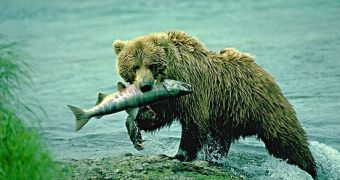Jenifer McIntyre from the Washington State University recently looked into how salmons respond to various amounts of copper that somehow make their way into their natural environment.
Her study indicates that this compound affects the animals' sense of smell, and therefore modifies their behavioral patterns.
The researcher explains that, when injured, a fish releases a very particular substance into nearby waters, usually referred to as “Scherckstoff” (the German word for “scary stuff”).
This alerts other creatures in its close proximity that a predator is present, and that it is best to flee or resort to other survival tactics in order to save their lives.
However, even the tiniest amounts of copper released into the environment by brake linings, pesticides, and building or mining operations make it impossible for salmons to detect Scherckstoff.
As one can easily imagine, this makes it easier for predators to attack them without their even trying to protect themselves.
Cited on the Washington State University's official website, Jenifer McIntyre explains the situation as follows: “A copper-exposed fish is not getting the information it needs to make good decisions.”
Thus, as her experiments showed time and time again, all salmon specimens swanning in water-tanks that contained absolutely no traces of copper simply stopped moving around when they became aware of the Scherckstoff warning signal.
As the researcher explains, this meant that predators who rely on motion in order to locate and hunt down their next meal simply could not spot them.
On the other hand, the copper-exposed specimens carried on with their usual business, therefore allowing for predators to find them.
Given the fact that salmons are part and parcel of today's food industry – not to mention the fact that countless other species such as bears rely on them as an important source of nutrients –, perhaps it would be best to help protect their population by not making them this vulnerable to various predatory attacks.

 14 DAY TRIAL //
14 DAY TRIAL //